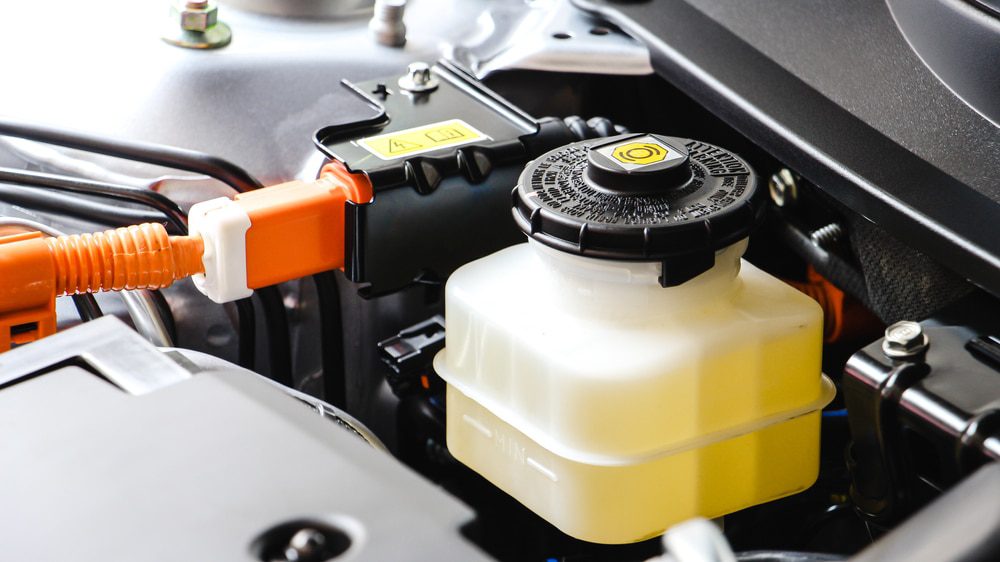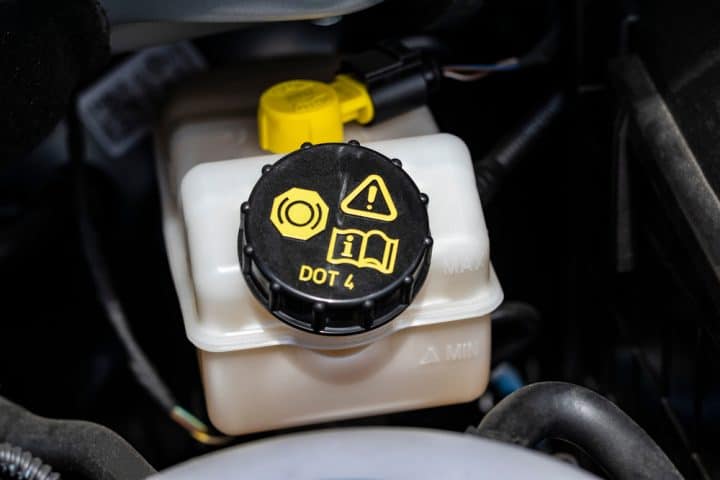Checking Your Volkswagen Brake Fluid
Ensuring that your brakes are in good working condition is crucial for your safety on the road.
Your brakes play a significant role in enabling you to stop your vehicle safely and effectively, whether you need to come to a gradual or immediate halt. To ensure optimal performance, it’s essential to keep your brake fluid in good condition, as it is a crucial component of your braking system.
The brake fluid in your Volkswagen is crucial for effective braking as it lubricates the moving parts, minimising friction and preventing wear on the braking system components.
In this blog post, we will be discussing the significance of brake fluid in the braking system, the potential outcomes of driving with contaminated or dirty brake fluid, and the ways in which you can evaluate the condition of your Volkswagen brake fluid.
So with that said, let’s begin…

Why Volkswagen Brake Fluid Is Important
Your Volkswagen braking system relies on hydraulic fluid, known as brake fluid and is dependent on it for several reasons:
Effective braking: Brake fluid plays a crucial role in the braking process. When you press the brake pedal, the brake fluid transmits the force from the pedal to the brakes, enabling them to engage and slow down or stop the vehicle. It creates hydraulic pressure that activates the brake callipers or master cylinders, causing the brake pads to make contact with the brake drums. This friction between the components generates the necessary stopping power. In essence, brake fluid enables the transfer of force from your foot to the brakes, allowing you to control your vehicle’s speed and bring it to a safe stop.
Heat dissipation: Brake fluid dissipates heat by absorbing it from the brake components and transferring it to cooler areas. It is designed to withstand high temperatures without boiling or forming air bubbles. This helps maintain effective braking performance and ensures your safety on the road.
Protects the braking system: The function of brake fluid is to lubricate the moving parts in the braking system, which helps to minimise friction and wear and tear. It also safeguards against corrosion of the various components that make up the braking system in your Volkswagen.
We suggest following the brake fluid maintenance schedule recommended by Volkswagen for your vehicle to ensure optimal brake performance, which is crucial for your safety.
At Donnellan Auto Services, our experts are experienced at servicing and maintaining the braking system of your Volkswagen. By doing so, we can save you both time and money since brake repairs can be quite costly. Our services offer the same level of quality as your local Volkswagen dealership but at a better value than what the dealership provides.
Get in touch with us today to schedule an appointment.
How Driving with Low or Dirty Brake Fluid Can Be Harmful
Driving with low or dirty brake fluid can lead to reduced performance and jeopardise your safety while driving.
Did you know that dirty brake fluid can have a negative impact on braking performance? This can result in increased stopping distances and can cause your brakes to deteriorate due to reduced heat-dissipating capabilities. In extreme cases, it can lead to complete brake failure.
Contaminated brake fluid can also cause corrosion and harm to the various components in your Volkswagen braking system. This corrosion can affect critical parts like brake lines, callipers, and master cylinders, thereby affecting how they function and causing further issues.
It is important to regularly maintain your Volkswagen brake system to avoid potential issues. Worn brake pads, callipers, and master cylinders can compromise how the braking system works, leading to leaks or even brake system failures.
Brake fluid that is low or contaminated can also cause damage to the Anti-lock Braking System (ABS) in your Volkswagen. The ABS is designed to assist drivers in maintaining vehicle control when braking on challenging surfaces by preventing wheel lock-up. To ensure that the ABS can effectively regulate braking pressure during emergency situations, it requires clean and properly functioning brake fluid.

In situations such as emergency stops or on slippery surfaces, it is crucial that your brake fluid is working exactly as intended. Regularly adhering to your recommended brake fluid maintenance schedule will help prevent dirty or contaminated fluid.
How Do I Check the Brake Fluid In My Volkswagen?
For your safety on the road, it’s crucial to have a trustworthy garage handle brake fluid replacement or maintenance. Donnellan Auto Services can assist you with top-quality braking fluid that is specifically recommended for your Volkswagen’s make and model.
You can, however, check VW brake fluid yourself by following these steps:
- Park your vehicle on a level surface and turn off the engine.
- Locate the brake fluid reservoir. It is usually a translucent plastic container located near the back of the engine compartment. The reservoir is typically labelled with “brake fluid”.
- Clean the top of the reservoir to ensure no dirt or debris falls into it while you check the fluid level.
- Look at the side of the reservoir to find the minimum and maximum markings or a “full” line. The fluid level should be between these markings.
- If the fluid level is below the minimum line, you will need to add brake fluid. Consult your vehicle owner’s manual to determine the correct type of brake fluid to use, or speak to us here at Donnellan Auto Services for advice
- Unscrew the cap of the brake fluid reservoir. Be careful not to let any dirt or debris enter the reservoir.
- Add brake fluid gradually, using a funnel if necessary, until the level reaches the appropriate level.
- Replace the reservoir cap securely.
- Once you’ve checked and, if needed, topped up the brake fluid, visually inspect the reservoir and surrounding areas for any signs of leaks or damage. If you notice any problems, it’s advisable to have your brakes inspected by a qualified mechanic.
These are the basic steps to checking your brake fluid, but always refer to the owner’s manual as this will provide you with specific instructions and considerations tailored to your particular VW model.
At Donnellan Auto Services, we’d always recommend letting one of our VW specialists look at this job for you. We’ll ensure your brake fluid check and replacement get you safely back on the road in no time. Call us today.
In Summary
Maintaining the brake fluid in your Volkswagen is crucial for the braking system to function properly. It ensures lubrication of the system components and protects them against corrosion.
Contaminated or low brake fluid can lead to expensive repairs and jeopardise your safety, as critical parts, such as brake lines, callipers, and master cylinders, may be compromised. Dirty brake fluid can also affect how the Anti-lock Braking System (ABS) works, again causing safety issues.
Brake fluid maintenance or replacement should always be handled by a qualified specialist.
Our Volkswagen experts at Donnellan Auto Services make sure that your Volkswagen receives the best care. We will replace your brake fluid with clean, high-quality fluid, giving you peace of mind. Get in touch with us today!
Our Location
Find Us
Donnellan Auto Services
Oranmore Business Park
Oranmore
County Galway
H91 HPC0
091 792474
Opening Times
| Monday | 08:30 - 17:00 |
|---|---|
| Tuesday | 08:30 - 17:00 |
| Wednesday | 08:30 - 17:00 |
| Thursday | 08:30 - 17:00 |
| Friday | 08:00 - 16:30 |
| Saturday | Closed |
| Sunday | Closed |




Car Repairs & Services
- ADAS Calibration
- Airbag Repairs
- Automatic Gearbox Servicing
- Car Air Conditioning
- Car Batteries
- Car Brakes
- Car Diagnostics
- Car Lights
- Car Repairs
- Car Safety Checks
- Car Servicing
- Car Tyres
- Clutch Replacement
- EV Repairs & Servicing
- Fleet Maintenance
- German Vehicle Specialists
- Hybrid Repairs & Servicing
- Mechanical Repairs
- NCT/CVRT Preparation
- Oil Change
- Steering
- Suspension
- Timing Belts / Cambelts
- Van Repairs & Servicing
- Wheel Alignment
- Wheel Balancing
- All Car Repairs & Services…





